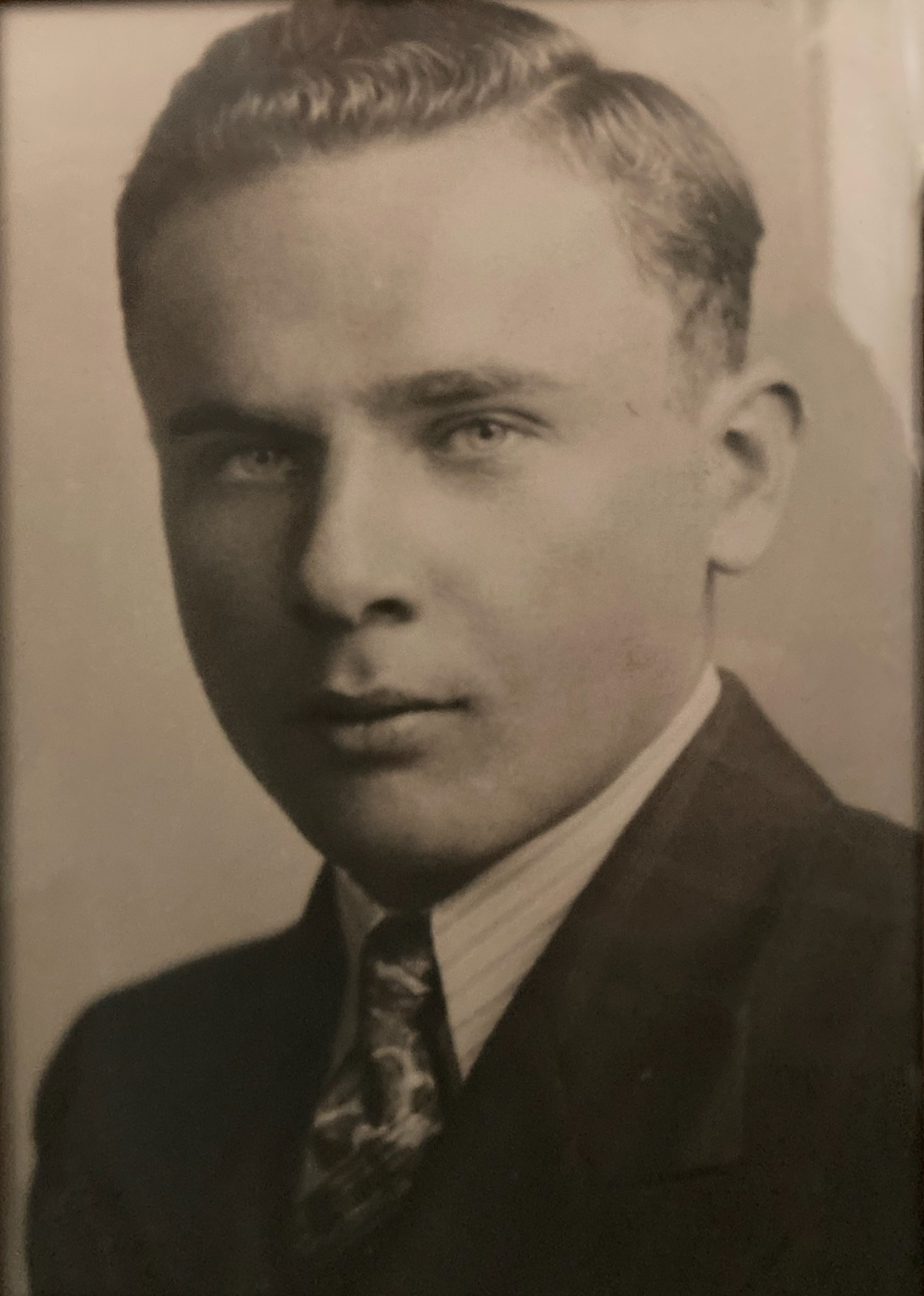Bielsk Podlaski
Memoirs of
Charles A. (“Charlie”) Kaplan
(Yehiel Kaplanski)
Born
(approximately): January 3, 1919
In Orenburg,
Siberia, USSR
Youngest of Nine
Children of:
Chaim Zui Kaplanski
and Zlata Neidetch
Died: February 27,
1994
Falls Church,
Virginia, USA
This is an unedited portion of a manuscript written
circa 1981 by Charles A. Kaplan.
Thanks
to Stan Kaplan for contributing this memoir written by his
uncle. Charles was 10 years old when the last of his Kaplanski
family left Bielsk Podlaski for the United States in 1929.
Charles's father, Chiam Zui Kaplanski, came to the United
States in 1923 with one daughter. Their mother, Zlata Neidetch
Kaplanski, came to the United States in 1929 with four
children. One of their sons arrived in the U.S. before WW I
and three sons remained in Russia after WW I as they had
established themselves there. In his notebook, Chaim recorded
the birth of his children as follows:
•
Haron was born Sunday parashas Korach, 26 Sivan 5656 / 26 May
1896
•
Yidel was born Tuesday parashas Shemini, 20 Nisan 5658 / 31
March 1898
•
Yehoshua was born Monday parashas Toldos, 26 Cheshvan 5660 /
18 October 1899
•
Yaakov {=Jacob} was born Monday parashas Vayeshev, 21 Kislev
5662 / 19 November 1901
•
My daughter Roizel was born Sunday parashas [Vezos ha]Bracha,
16 Tishrei 5665 / 12 September 1904. That was the second day
of Sukkos.
•
My daughter Chana was born Saturday parashas Shemini, 29 Nisan
5667 / 31 March 1907. That was when we blessed the month of
Iyar. {Traditionally, a blessing is recited in the synagogue
on the Saturday before a new month}
•
My son Motte was born Wednesday parashas Noah, 28 Tishrei / 30
September 1909
•
My son Frayim was born Tuesday parashas Beshalach, 11 Shevat /
17 January 1912
•
My son Chiel was born 21 March 1919
Stan Kaplan and his wife, Lois, visited Bielsk Podlaski during
the summer of 1978 and had the opportunity to explore the
Kaplanski home. They were told that as a result of urban
renewal such old neighborhoods were being rebuilt and that had
they come much later the house would have been gone.
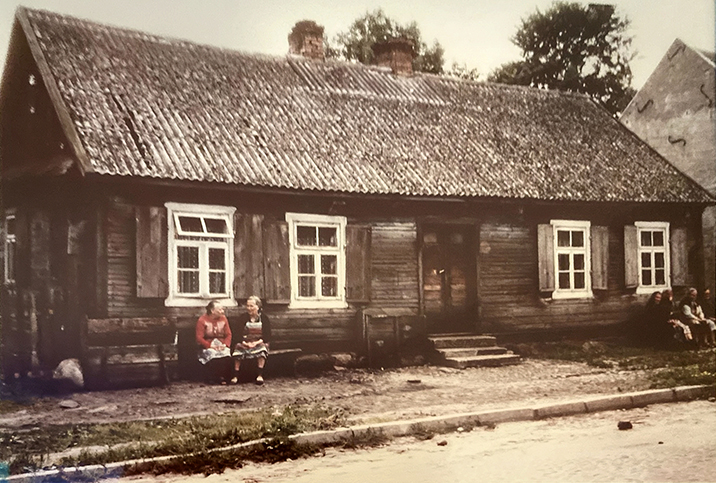
(click for larger image)
The Kaplanski house at
Kazimierzowska 28 in Bielsk Podlaski was across
the street from a synagogue and a cheder, which Charles
described below.
Photo taken in 1978 by Stan Kaplan.
Reflections in Retrospect
by Charles Kaplan
I have read numerous biographies and autobiographies of famous
people and I wonder, when they describe their childhood as to
who or what was the source of their information; how accurate
was it, and how much of it in the course of time is clouded in
imagination. If no daily diary is kept by someone as a means of
reference, at what age is a child’s experiences vividly fixed in
his mind, something he can recall for the rest of his life.
I
was born in the city of Orenburg, deep in Siberia, U.S.S.R., the
youngest in a family of nine. The source of this information was
my mother, may she rest in peace. The exact date of my birth I
do not know. I use the date January 3, 1919. You may well ask as
to why I use that particular date.
Charles Kaplan
Well, when I was in junior high school, one of my teachers, for
some specific administrative reason, was instructed to call out
the birthdays of the members of the class. What the source of
her information was that mine was January 3, 1919, I do not
know. However I have used it ever since. I do remember that my
Bar Mitzvah was in the dead of winter, so whatever disparity
exists, it is not very great or of any consequence.
All
other eight members of my family were born in Bielsk Podlaski,
Poland. Again you may well ask how it is that my mother gave
birth to me deep in Siberia? Well, we’ll have to delve a little
bit into the history of Poland.
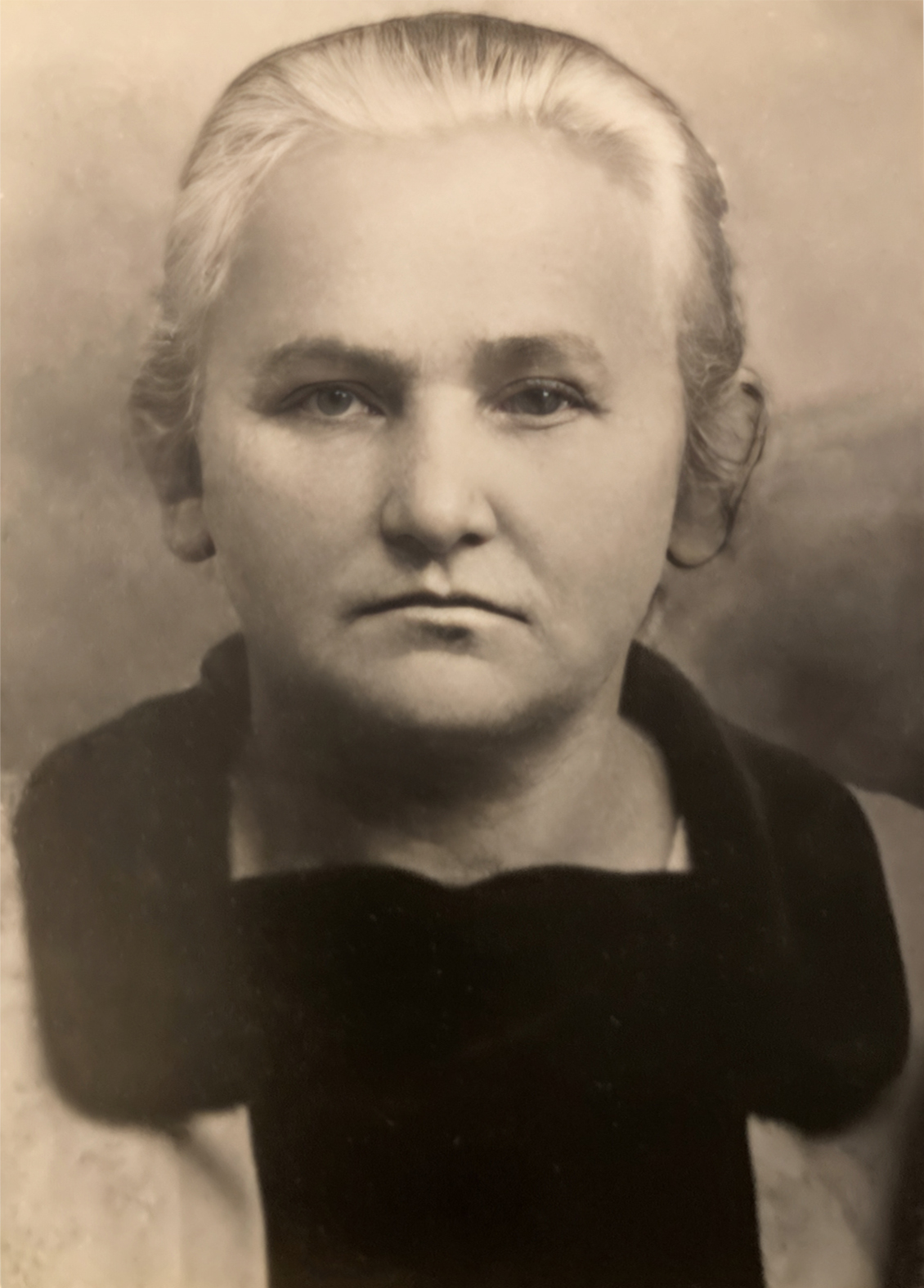
Zlata Neidetch Kaplanski
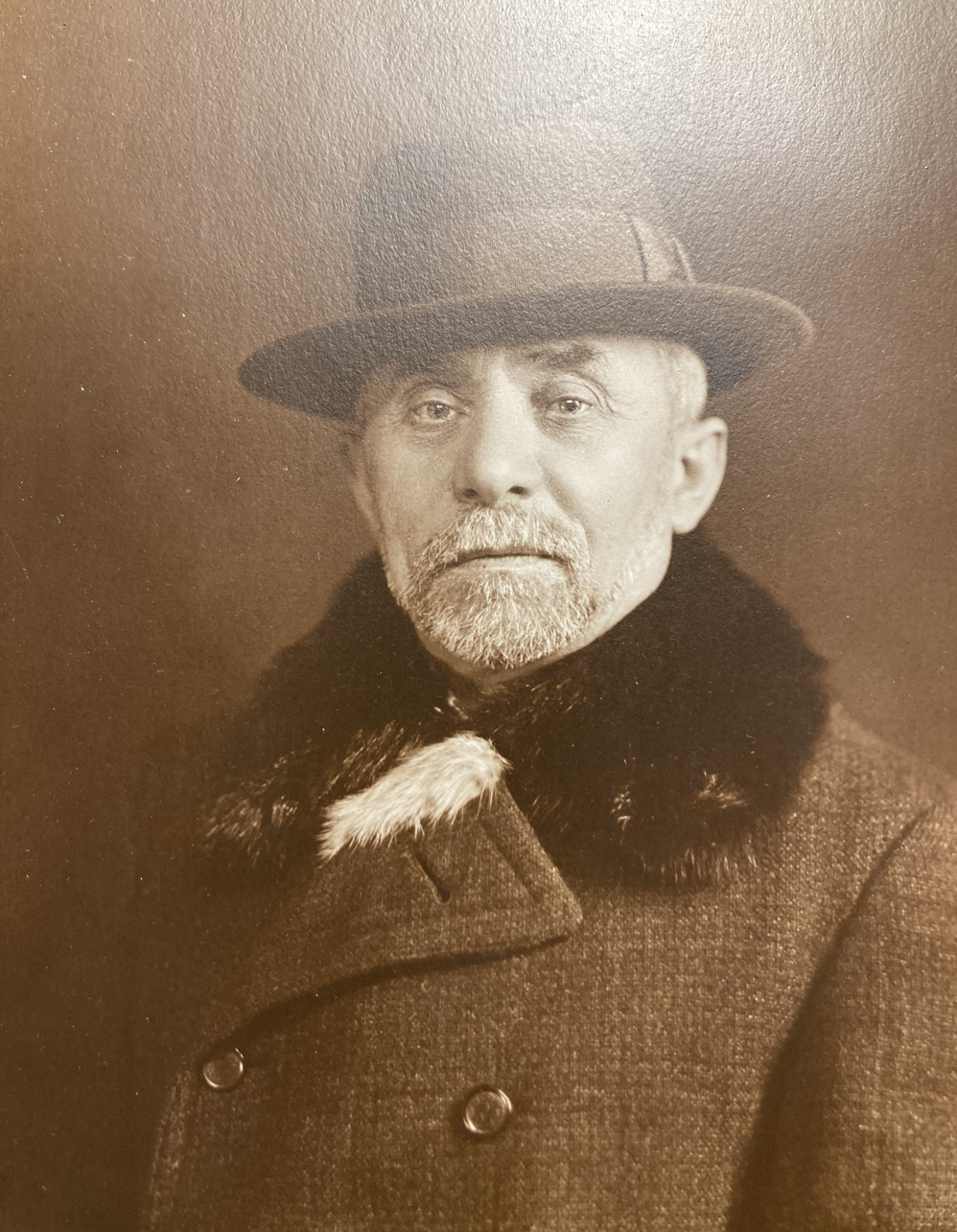
Chaim Zui Kaplanski
The
family lived quite well despite the fact that the rest of Russia
was in the throes of anarchy, chaos and revolution. The
Bolshevik government was then established, but was fighting for
its very life against the Whites and foreign invading powers.
That the Red Army prevailed and defeated all opponents is a
tribute to one man, Leon Trotsky (Lev Bronstein) a Jew and a
natural military genius, who commanded the Red Army and molded
it into an effective and disciplined fighting force from the
disorganized rabble that it was shortly after the Revolution.
My
memories of life in Russia are very shadowy. Just a few vague
flashbacks. I was told that the winters were very severe with
heavy snowfalls reaching almost to the eaves of the houses.
Walkways and tunnels had to be dug to reach the streets and
horse drawn sleighs were the main means of transportation.
When the situation in Russia had stabilized and the victorious
Red Army, which had advanced to the gates of Warsaw, had
retreated back to Russia after the threat of French
intervention, my father, who owned properties in Poland felt
obligated to return and claim them. This scenario was no doubt
played out by many families in the same situation as ours.
During the Revolution in Russia, the Baltic countries as well as
Finland and Poland had declared their independence. When peace
was declared in November of 1918 and the League of Nations
subsequently established, the independence of these countries
was recognized by the League and in the case of Poland, she was
awarded by the Treaty of Versailles, a slice of Prussia
incorporating the city of Danzig, currently called Gdansk, as an
access to the North Sea.
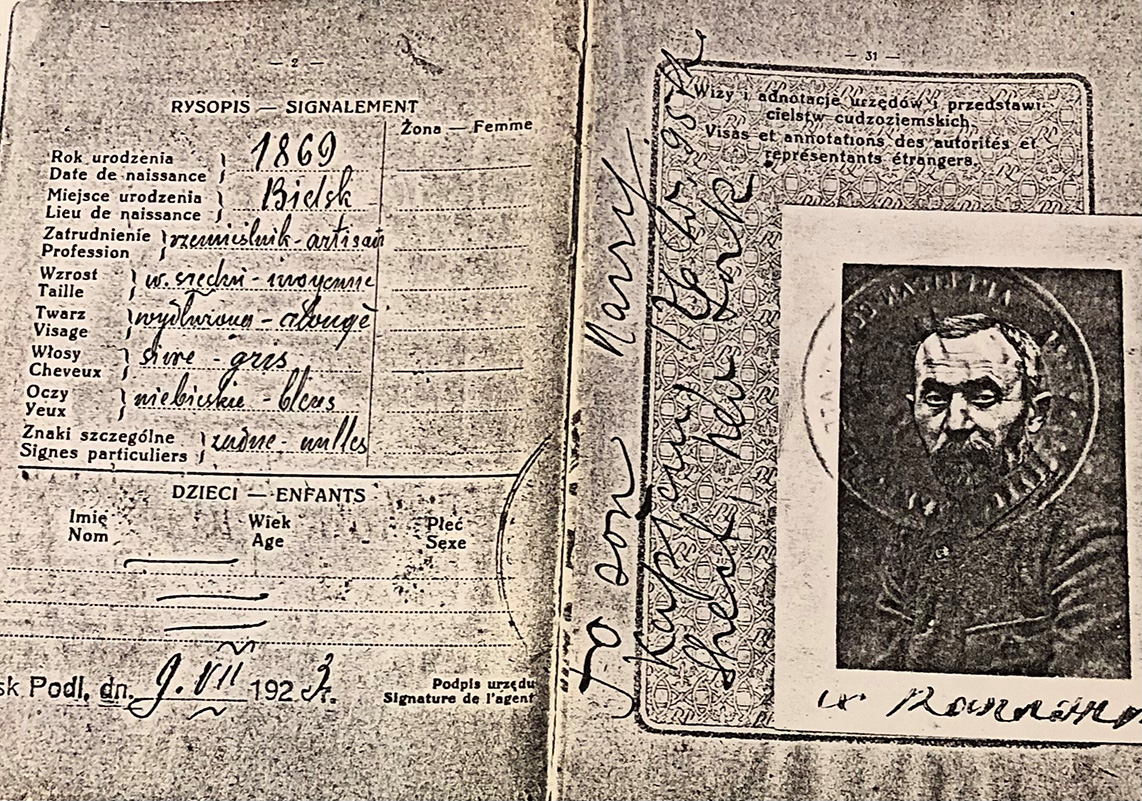
Passport of Chaim Zui Kaplanski (click for larger
image)
While preparing to leave, three of my oldest brothers declared
that they would remain in Russia. My oldest brother Harry had
left for the United States before the war had started. He was
sponsored by my uncle Louis who fled Russia to avoid being
drafted into the military. The other three brothers were
sympathetic with the Bolshevik cause and either one or several
had served with the Red Partisans. Also they were married and
had families. My father, contrary to my uncle Louis, served for
five years in Czarist Imperial Army in the District of Orel, a
scene of a great battle during World War II. During the
Russo-Japanese war my father who had been placed in the reserves
was called to the colors. Since he was already a family man, he
had an operation performed grafting his trigger finger to the
middle finger. The graft was only up to the first joint, but it
was enough to disqualify him from service. He never had the
fingers separated. My uncle Louis had a toe lopped off to avoid
the draft. This didn’t always work particularly when the quota
of draftees was not reached. So he had fled. Service in the
Russian Imperial Army was so severe that thousands of young men,
particularly Jews, mutilated themselves to avoid military
service.
I
was too young to remember the trip back to Poland. It was made
by train in box cars with all the possessions we could carry.
I’m sure it took a long time but we reached Bielsk-Podlasky. The
Russian currency we had was worthless in Poland. So we were
penniless. Happily our neighbors who either remained or preceded
us back to Poland were kind enough to help us out with victuals
and other necessities till my father could get back on his feet.
Being a highly skilled painter and paper hanger, he soon found
work and became established.
My
earliest memory of my father was fear. Punishment for
misbehavior was meted out on the spot. I was told that when he
returned home from work, probably tired, all children became
instantly quiet. My mother would report to him any disciplinary
problems she had and punishment was instantly administered. My
reaction to his presence was to hide in a corner and make a
frothing noise at the mouth.
One
part of our house served as a small neighborhood grocery store
which my mother ran. Since most of the customers had little
money, my mother made little profit.
While most of Europe was recovering from the war during in
1920s, the United States was experience a great building boom.
All the building trades people were raking in the money and
became prosperous. Since my father was highly qualified, it was
decided that he should go to the United States to establish
himself and the rest of us would follow after he had saved
enough. So in the year 1922 he and my sister, Rose, sailed for
the states. I seem to remember being taken to the railroad
station to say good bye to him. My mother wept a good deal, for
on her rested the burden of managing the family.
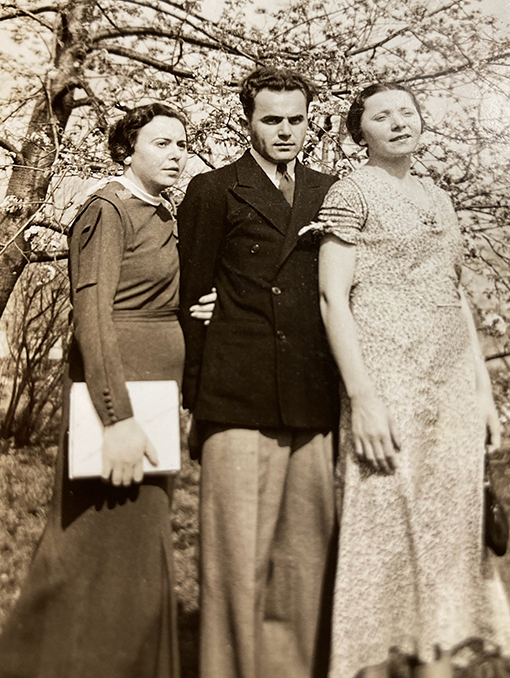
(L-R) Rose, Martin, and Anna
My
early childhood memories are very vague. It wasn’t long after my
father’s departure that my mother closed the grocery store. I
assume we lived on rentals coming in from two of the houses we
owned as well as money sent from America. In comparison with
other neighbors, we were considered well off. I never remember
going hungry or lacking food. We had a cow and chickens to
furnish us with milk and eggs. In the spring and as long as
pasture was available, our cow as well as the cows of the other
towns people would be driven to a common pasture by a cowherd.
As he came down the street very early in the morning he would
call out and it was my brother Frank’s job to make sure that our
cow joined the herd. Around sunset when the cowherd returned
back with his charges, our cow would peel off as she approached
our house and enter the cobbled courtyard to the barn. There
Frank would milk her and my mother would always give me a big
tin of warm frothy milk to drink with a lump of sugar. The last
time I drank warm milk from the cow was when I worked on a
poultry farm in Connecticut in 1940 and 1941.
I
used to like to watch a cow being milked, and as it appeared so
easy, I decided there was nothing to it. So one day after the
cow had returned and was being watered, I impulsively stooped
down and took hold of one of the udders and squeezed. In an
instant the cow delivered a swift kick to my shin. Talk about
crying, the pain was intense and my pride was hurt. However, I
learned a lesson and from then on left her alone.
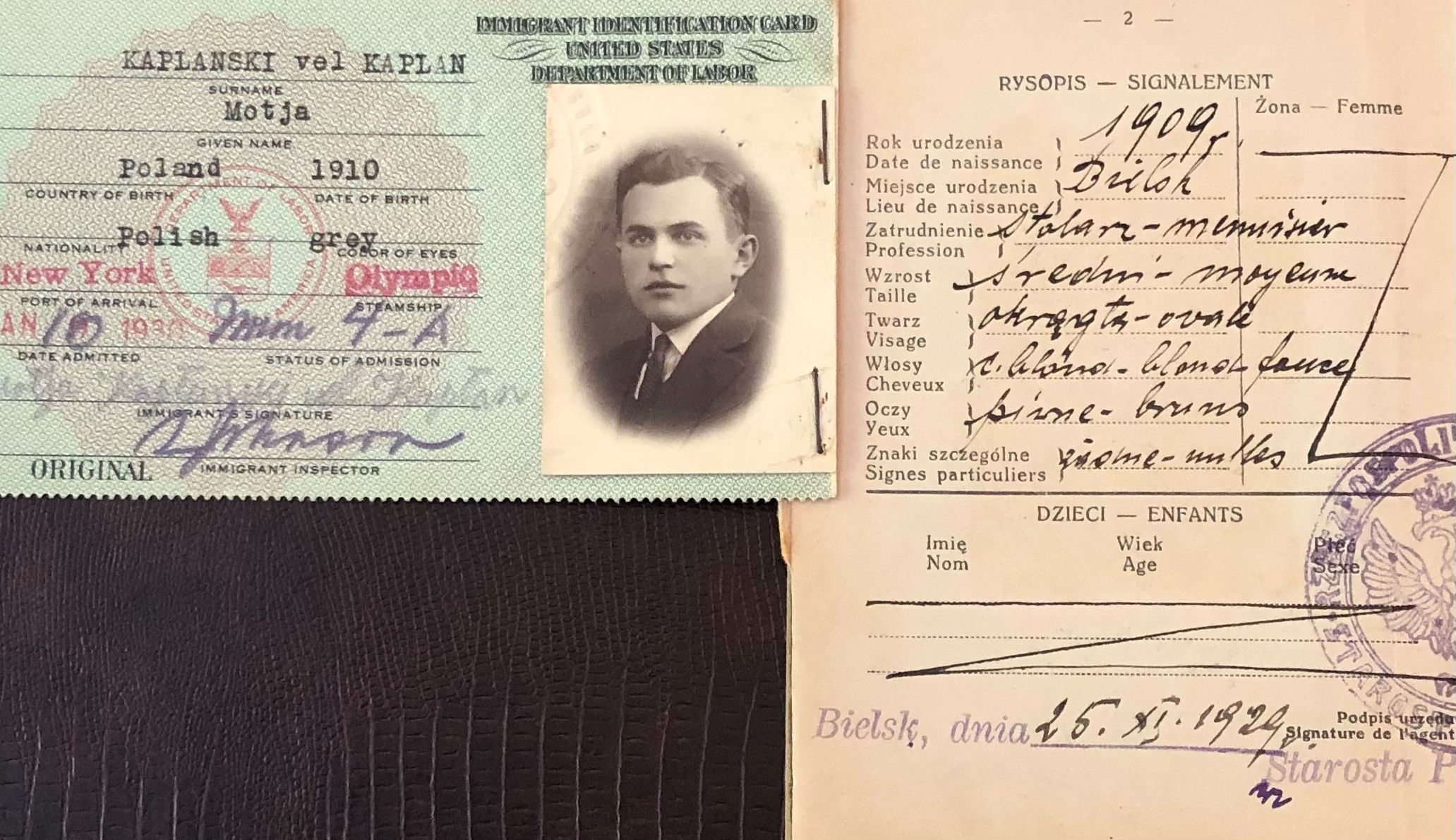
Passport of Martin (Max) Kaplan (click for larger
image)
After milking, the warm milk was stored in earthenware jugs in
the cool pantry, since we had no ice house or any kind of
refrigeration. As we had a separator, we would wait till the
cream rose to the top. After skimming it off, it would be poured
into the churn for making butter. I used to help out in working
the churn which was an arduous job. The milk in the jugs, after
the cream was removed, would sour and form into curds or
clabber. This would be poured into a wedge shaped muslin bag,
which would be hung from a nail in the ceiling beam. After the
liquid had dripped out, the bag would be laid on a board,
another board would be laid on top and a heavy stone would be
laid on top of it. In twenty four hours we would remove a
perfectly molded cottage, or as it used to be called, farmer
cheese. This was very nourishing food and was an important part
of our diet. To moisten it and make it easier to swallow, we
would mix it with sour cream, if available. Everything we ate
with bread. That is the custom in Europe. Although, we never
lacked for food, there wasn’t what you might call a great
variety to the diet. Certainly not the abundance to which we are
accustomed to and which is available to us in this blessed land.
We enjoyed fruits and vegetables in the season. In the long
winter months, the fruits and vegetables available to us was in
dried form. To an extent we stored potatoes, beans, and peas.
The main green vegetable was sour kraut, made and stored in a
barrel. Although canned goods were stocked in the stores,
it was mostly imported stuff and quite expensive. As my mother
was a very economical person and drove a hard bargain, we, as
well as our neighbors, rarely resorted to buying canned goods. I
do remember though occasionally eating canned sprats. Oh, how I
loved them. Also as an occasional treat I’d be given an orange
or a tangerine, which was called mandarin. Ice cream in winter
was unheard of. But I certainly ate and enjoyed it frequently in
the summer. I also had a love affair with chocolate.
Sports in the winter consisted of ice skating, for those who
could afford a pair of skates. For the most of us it was
snowball fights and sliding on any frozen ditch or field. Almost
all of us wore boots and we’d take a long run and then see how
far we could slide. To add a little variety, we’d turn our
ankles in or out and slide on the edges of the soles of the
boots.
I’ll never forget the time we were let out for a short recess
from school and all of us immediately headed for the frozen
drainage ditch in the field adjacent to the school to go
sliding. After the recess period was up, we were called back to
class. However, one boy, son of a butcher, who had the same
surname as I, did not come in at the same time as the rest of
us. In fact he was having such a good time he returned
considerably later. When he finally came in the rabbi asked him
where he had been that he didn’t return with the rest of us.
Dissatisfied with his reply, and as an object lesson to the rest
of us, he took hold of him to lay him on the table to spank him.
The lad, a husky youngster, struggled and resisted valiantly.
However, the rabbi, a good sized man, prevailed, lifted the boy
unto the table, pulled his trousers down and applied a vigorous
hand to his naked buttocks. I’ll never forget this as long as I
live. Complaining to one’s parents about such treatment did not
good for they felt that it was the boy’s fault and they would
administer a second punishment.
There were some Jewish holidays in winter time to which we
youngster looked forward to. One was Kha-mi-sha-assar Bishvat,
or fifteen days in the month of Shvat, the fifth month in the
Hebrew calendar. It is celebrated as Arbor Day in Israel and we
generally used to eat St. John’s bread. This is actually a
fruit, when dried turns chocolate color and is very flat with
dark seeds within. Like all dried fruits it is very hard and one
needs sound teeth to chew it. I loved that fruit.
The
other holiday is Purim which is celebrated a month after Shvat,
on the fourteenth day of the month of Adar and is about six
weeks before Passover. Purim means the casting of lots. In the
book of Esther, Haman, the prime minister to the king of
Exerxes, wished to kill all the Jews in the Persian Empire.
Having cast lots for an appropriate day to commit this atrocity,
it fell on the fourteenth day of Adar. The emperor signed the
decree. However, through the intervention of the beautiful queen
Esther, her Jewish name was Hadassah, who reminded the emperor
that it was the Jew Mordecai, her uncle, who saved his life by
disclosing a plot to have him poisoned. The emperor reversed his
decision and the Jews were saved. In the synagogues when the
scroll of Esther is read, every mention of Haman’s name evokes a
terrific noise with an assortment of noise makers, or stomping
of feet. Those of us who stayed on the periphery of the crowd or
outside the synagogue would sound off with fire crackers. As cap
pistols were expensive, we used to good affect an old style key
that had a hollow stem. We would stuff caps inside the stem and
with a big nail that was tied to the top of the key shove the
point of the nail into the hollow and swinging the head of the
nail against any solid object would make a resounding noise. On
that holiday the mothers would bake Hamantaschen, folded sweet
dough triangles stuffed with poppy seeds.
We
also celebrated Hannukah and played with tops called dreidels
and ate potato pancakes. There is no need for me to elaborate on
that holiday for that is probably familiar to you.
If I neglected to mention it, I was enrolled in school at the
age of five by my brother Frank and the beadle from the nearby
synagogue. It was a Hebrew school of squared log construction
called a Heder (room), abutting the synagogue. The school was
already quite old when I started attending. The classrooms were
furnished with long benches and tables where five or six of us
sat. In that respect it resembled the pioneer schools in this
country. Holes in the tables held inkwells which the pupil
supplied as well as the books and writing materials. The school
was rat infested with holes in the floor big enough to see them
milling around.
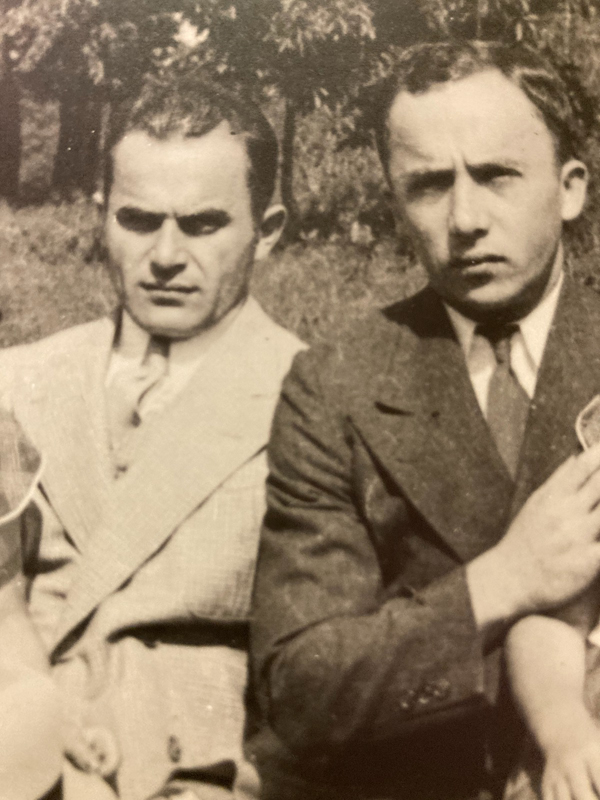
Martin and Frank Kaplan
At
lunch break the school would be locked up while we all proceeded
home to have a hot meal. Upon our return, while waiting for the
school to open up, we would peer through the windows and see the
rats jumping from table to table, having the run of the
classrooms. It was cold in winter and hot in summer. As I
recollect, the classrooms were built around a glazed tile wood
fire place and each room had one side of the furnace to keep it
warm. One had to dress warmly and the animal heat did the rest.
In the summer the windows were fully opened and the flies came
into the classrooms in swarms. To amuse ourselves when we got
bored, we used to catch flies and squeeze them in the middle to
determine the sex. If it was a male fly, we used to attach a
long thread to the male organ and raptly watch him fly around.
Some of the pupils would bring different colored threads and
attach them to the flies and we would have a ball. Or we would
catch flies and full off their wings.
If
discipline became a little lax, the rabbi would descend among us
and let fly blows right and left. One of my buddies, son of a
carpenter, a lean tough boy, ran afoul of the rabbi who started
to pummel him. Normally we would cover up with our arms and
accept the punishment. He was nervier. He picked up a chair and
with the legs facing the rabbi pushed it at him until the rabbi
quit. We all admired the tough strong boys and we learned early
not to tattle or squeal on another pupil.
To
take care of our bodily needs, there was an outhouse. However,
the rabbis mainly used it. The rest of us relieved ourselves in
the vicinity of the outhouse.
Scholastically I didn’t rate very highly. I learned the Hebrew
alphabet easily enough. It was when we got into the Petateuch
that I first encountered difficulty. Our books were written in
Hebrew and for the rabbi to know whether we understood what we
were studying, it was necessary for us to translate it into
Yiddish. That wasn’t my difficulty. My trouble arose when I had
to explain what was meant by this or that sentence. That was the
crux of the matter. It went like this. The rabbi would read a
sentence or paragraph in Hebrew and elaborate on it in Yiddish.
It was up to us to pay close attention and repeat it. If you
didn’t understand you asked questions. If you paid attention and
had a retentive memory or were smart and understood, it was no
problem and the rabbi was highly pleased. Since I lacked these
qualifications, I had difficulties.
After studying the bible all day, we had to study Polish and
math at night which apparently was a state requirement. I can
truthfully say that math was the bane of my existence. I could
only manage the easiest computations. Anything slightly
different or with some degree of difficulty threw me into a
panic and I instantly developed a mental block. This handicap
was to last me all my days. I well remember a young lady teacher
who taught Polish and math being so frustrated with my lack of
comprehension that she took her fist and pounded me on the
shoulder in an effort to make me understand.
One
of my rabbis was an elderly man who would nod off to sleep as he
was teaching. At the urgings or promptings of the other boys, I
would slip under the table, approach the rabbi, tug at his beard
and very quietly scoot back to my seat. While I was performing
this little mischief every one would watch raptly and laugh
quietly. As the rabbi roused himself and cast a suspicious eye
on us, we would all be sitting demurely looking at our books.
Once I was almost caught and it was the habit of not squealing
that we all adhered to that saved me from a good beating.
Despite all the deviltry and mischief we created, we all had a
pretty good grounding in the Jewish faith and, if you will, in
the Old Testament. After we began studying Judges and Kings, we
were fascinated by the stories of great Hebrew military heroes
and their exploits. To me studying the prophets was a drag and a
bore. I became tired of reading of the sins and transgressions
of Israel and Judah. Since the Jews have been reviled as being
weak, cowardly, bookworms and shylocks totally lacking in
military abilities, the stories of Samson and King David and
their exploits were very uplifting.
In
the decade of the 20s, vaudeville was a popular entertainment
medium in the theaters. Among the acts rating high in popularity
were those performed by strong men, such as bending iron into
fancy shapes, supporting and lifting very heavy weights, driving
spikes through heavy tables with their hands and other assorted
feats of strength. One of the best, if not the best, was a
Jewish strongman, Sigmund Breitbart. Born in the city of Lodz to
an impoverished blacksmith, he demonstrated great strength in
early childhood. In fact all his brothers and sisters were
endowed with great strength, but he as the outstanding member.
He was a handsome blond with wavy hair, and built like a Greek
god. He not only performed before large audiences prodigious
feats of strength, but did it with an unsurpassed finesse, speed
and showmanship. He was the pride and toast of all the Jews. I
saw only photographs of him, but I did see a length of iron that
he bent into scrollwork.
Some years back there was a program on television reviewing
entertainment in the 20s and they showed Sigmund Breitbart
bending iron into various designs. I sat enthralled watching
him. Through him I was inspired to become a devotee and
participant into the field of physical culture. He wrote an
autobiography in Yiddish which I found in a New York library
which I read several times.
As
I had previously mentioned, most of the people on the street
where I lived were small trade’s people. Catty corner from our
house was the blacksmith, who with one of his strapping sons,
fashioned horse shoes, shod horses, and sweated iron rims on
wagon wheels, as well as the hubs. The wheelwright was further
up the street from the blacksmith. I also used to watch him
rough out with a razor sharp hatchet the sections of the wheel,
make and fit the spokes, and turn the hub on a lathe. When the
wheel was completed he’d roll it over to the blacksmith to have
an iron rim sweated on it. In my town, the craftsmen handled
every phase of the article he turned out. A young lad was
considered quite fortunate to be apprenticed to a craftsman and
learn a trade. He got paid very little if anything at all. At
one time it was customary for the parents of the apprentice to
pay the master a tuition fee for teaching him the trade. The
apprentice’s life was not an easy one, but upon completion of
his apprenticeship and attaining the position of a journeyman,
he was secure in the knowledge that he could make a good living.
After the long winter months we welcomed the spring and summer
with open arms. First off we looked forward to all the holidays
such as Passover, Pentecost, and the high holy days such as Rosh
Hashanah, Yom Kippur and Succoth. There were also a few fast
days in between when school was closed. As soon as it became
warm enough, we doffed our boots and shoes and ran around
barefooted. We also went swimming in the nearby river. We bathed
or frolicked in the water in our birthday suits. I never saw a
bathing suit till I came to this country. Yet housewives brought
their laundry to the river and paid us no mind. It was an
understanding that the males had the upstream part of the river
and the females the downstream. Daring young men would swim
underwater to the downstream part to size up and report on the
opposite sex.
In
our town there was a Yeshiva (a seminary to train rabbis).
Faithfully, every summer day the seminarians would break from
their studies to swim wearing nothing but their brimmed hats.
They could swim like fish for in the Talmud there is an
injunction for the fathers to teach their children how to swim.
Every once in a while a fight would develop between the Gentiles
and the Jews while swimming and they would pelt each other with
stones and clods.
Summer time was also an occasion to raid orchards when the fruit
started to ripen. One time a buddy and I got into an orchard
owned by a Christian and we began to stuff our pockets with
pears. Suddenly the owner appeared accompanied by a police dog.
Never had we been so frightened and ran so fast to escape the
dog whom he sicked upon us. I remember crawling past barbed wire
and jumping a wide ditch to affect an escape. But we still had
most of the pears.
Passover was one of the holidays which required most
preparation. Besides either baking or purchasing already baked
matzos for seven days, the household had to be completely
cleaned and all the leaven or anything made with yeast burned.
All observing Jewish households had three sets of dishes. A set
for dairy, another for meats, and a third for Passover.
Accordingly the other sets were stored away and Passover dishes
brought out. It was also the time of year when I was outfitted
from head to toe with a new hat, suit and shoes. The larder was
stocked with extra eggs, meats and wine. Also, Passover was the
season to eat nuts. Walnuts and filberts were the ones I
remember the best.
Being the youngest male, I had to ask the four questions at the
ritual of the Seder on the first two nights and the last night
of Passover. The Seder consists of the reading of the Haggadah,
the narration of the exodus of Israel from Egypt in the course
of which four cups of sacramental wine are drunk. Approximately
halfway through the narration a splendid meal is served which is
customarily eaten in a comfortably inclined position sort of
like the Romans at their famous feasts. The narration ended with
“next year in Jerusalem”.
One
of the courses sure to be on the meal was matzo ball soup. In
order to make the matzoth meal we had a huge wooden pestle and
mortar. Into it we dumped whole matzos and after a good deal of
labor pounded it into flour. Also to add a little body to the
soup we added in “farfel”, i.e. matzo that had been pounded into
small bits. For snacks we had matzo meal pancakes or matzo
dipped in egg batter till it softened and then pan fried.
Every Thursday was Fair Day or Market Day in our town. It was in
my opinion the most exciting day of the week. Peasants and
tradesmen from the surrounding areas came in their horse and
wagons bringing their produce to sell. Mothers with toddlers
holding on tightly to their skirts were be haggling with the
peasants for vegetables, eggs, and poultry. As most peasants
were unable to figure sums and since there was mutual distrust
between them and the Jews, when it came to totaling the sale of
several items, they would refer to the nearest policeman to be
sure there was no dishonesty and that the price was correct.
I
used to like to watch the horse traders buy or sell horses. They
were a rough, tough bunch, all Jews. In fact one of our tenants
was a horse trader. They didn’t back away from any fight that
might develop and which frequently did. The horse’s tails would
be tied in a knot, I suppose to better show off their hind
quarters, while he was examined and then trotted around. The
horse’s mouth would be forced open to examine his teeth and
estimate his age. Finally after much dickering and haggling a
price would be struck, seller and buyer would loudly slap each
other’s palm before applying a bone crushing handshake to clinch
the deal. We kids used to pull hairs from the horses’ tails to
make musical instruments. Not all horses tolerated having hairs
pulled from their tails. Some would kick out violently so one
had to be agile and also position himself to avoid a kicking
hoof.
If
my mother had, after much haggling, bought a fowl for the
Sabbath either my brother or I would be dispatched to have the
fowl ritually slaughtered. One of the neighbors rented a part of
their courtyard to have this vitally important ritual performed.
The slaughterer would grasp the fowl, pin back the wings and
hold them between his knees. Then seizing the beak would pull
the head up and back making sure the throat was taut. After
plucking a few feathers from the throat, would take the razor
sharp ritual knife, which he kept in his mouth pirate style,
make one slash across the throat and push the windpipe out of
the orifice. After carefully wiping the knife on the feathers
would toss the fowl aside, return the knife to his mouth and
start on the next one. This actually was the work of seconds.
Although the fowl was actually dead, it would run around for a
while as a reflex action till it collapsed.
The
fowl had to be dry plucked as dipping it in boiling water to
facilitate removal of the feathers is contrary to the ritual.
When the fowl is opened up and cleaned, the entrails and other
internal organs must be carefully examined to be sure everything
is normal and regular. Any irregularity, such as nodules or
tubercles, or any other suspicious irregularity, the offending
item is taken to the rabbi for determination by him as to
whether or not the fowl is kosher. If, after the examination he
renders a judgment that the fowl suffered some sort of disease,
thus making it trafe or not kosher, then you are not allowed to
eat it. This applies to any animal this is ritually slaughtered.
In a great measure this law together with other similar laws
protected the health of the Jewish community.
One
of the exciting events that occurred on our street was the
installation of utility poles and the subsequent lighting of our
street. Prior to that it was necessary to carry primitive
lanterns containing a candle to furnish feeble illumination at
night. It was shortly after that my mother decided to have our
home wired for electricity. When finally completed, we were
thrilled. It did away with the kerosene lamps, constant trimming
of the wicks, cleaning of the chimneys and comparatively poor
light.
It
was also around that time that my mother sent me to a secular
school. Prior to that I attended several private schools run by
teachers in their homes. One I didn’t like at all and stayed
there for a short while. The other one was only a little bit
better. My mother felt that the secular school would be more
beneficial to me. First of all it was co-educational and
secondly they taught modern subjects. In this school we were
compelled to speak in Hebrew and thus we all had a thorough
grounding and developed a competent fluency in that language.
Also in this school we did not wear hats in class except when
studying the bible.
My
difficulties in math continued and my mother engaged a young
lady who had been recommended to her to tutor me in that subject
as well as Polish. It wasn’t that I couldn’t learn; it was
simply a matter of being painfully slow to learn that subject.
As a matter of fact, with the tutorial help I was able to bring
my marks on the report card to respectable levels.
In
the school besides the regular subjects we were told stories
about Israel (then Palestine), the efforts of the halutzim
(pioneers) to rebuild the land which had been acquired through
purchase. In each Jewish home there was located a little blue
and white tin box with the Star of David prominently painted on
it and with a slot on top. Into the box secured by a little
lock, coins were dropped and every so often an authorized
individual would come bearing a little key to open the lock and
remove the donations. This was one of the methods of obtaining
funds to purchase more land in Palestine. The other was
donations by wealthy Jews such as the Rothschilds, etc. We also
celebrated all the holidays that they did in Palestine and heard
heroic tales of life and struggle in that land. A yearning and
hope for the return of the Jews in that land was kindled in us.
In
August 1929 an event occurred that will live in my memory for
the rest of my life. We had already sold our home and were now
lodged in a rented room awaiting notification of the date for
our departure for the United States. My mother had taken me out
of school so that I would be rested and in a good state of
health when departure time arrived. It was in the middle of the
week and in late noon that I noticed that the proprietors of
businesses in town were closing their establishments and
wondered why. I then learned that there were terrible riots in
Palestine. The Arabs inflamed by the Mufti and other religious
leaders were rioting. Gangs of Arabs attacked defenseless rabbis
and students in their classes. They killed, robbed, raped and
burned homes and looted shops. It was mainly directed at those
areas where the Hagganah (defense forces) were not available to
lend protection.
The
synagogues were filled with people, many who never came to pray.
We heard memorial prayers for those who were killed in Palestine
and listened to speeches deploring the violence. Our town rabbi
broke down and wept several times as he addressed the crowded
synagogue. This was the first and only protest meeting I ever
attended.
Despite the pogroms and numerous difficulties put in their path,
immigration to Palestine (Israel) continued.
Finally in the latter part of November 1929 we received the
papers advising us to prepare to leave for the United States. We
sold or gave away any possessions that we couldn’t take with us.
Then on a bitterly cold night in the first week in December we
took a coach to the railway station to board a train for Warsaw.
I felt a tug in my heart as neighbors and friends waved good-bye
to us. In Warsaw, we stayed in another lodging while we were
processed, photographed for passports, examined medically and
then sent with groups of other immigrants to another station of
more of the same. It seemed an eternity, but we were finally
taken by train to the city of Danzig (now Gdansk) and there
boarded a small steamer to take us to England. At that time of
the year the North Sea is the most violent and stormy bodies of
water in the world. I can tell you that the ship canted to a 45
degree angle and most of us were violently sea sick. After a
three or four day trip we sailed up the Thames, passed under the
famous London Bridge and docked. We were taken to the Victoria
Station in London, given something to eat and boarded a train to
take us to Southampton. My impression of the English countryside
was disbelief. In Poland a blanket of snow and ice covered the
countryside and here in England everything was green. In
Southampton we were further processed and examined and
subsequently boarded the White Star Cunard liner the “Olympic”.
It was a huge ship; nevertheless it was pretty well tossed about
in the Atlantic. I felt sea sick only half a day. Then my
brother Max ordered me to go top side saying it would make me
feel better. Sure enough it did and I didn’t feel sea sick any
more. As a matter of fact, during the war when we were on the
high seas sailing toward North Africa, I didn’t feel sea sick in
the slightest. However, I’m getting ahead of myself.
We
traveled third class. Passengers traveling first and second
class could come down and act uppity, but we were not permitted
to go and see their accommodations.
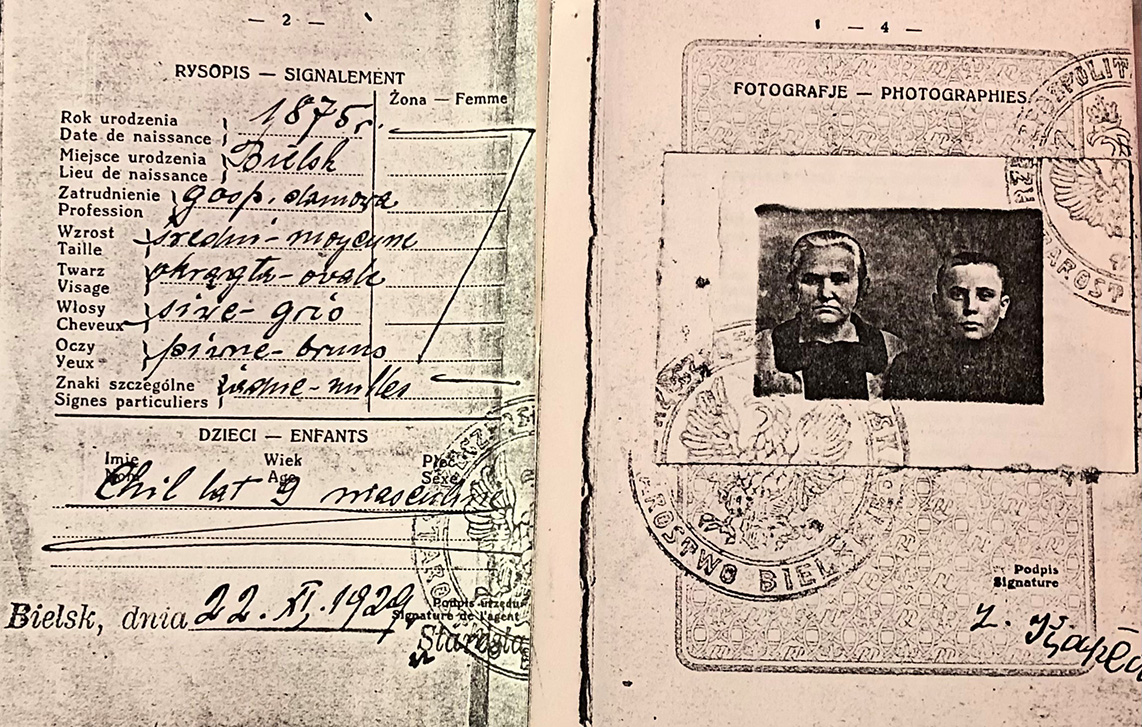
Passport of Zlata and Charles
Kaplan (click for larger image)
The main recreating was
eating. Coming from a small town the way I did, certain
fruits like bananas, pineapples, grapefruits were a novelty.
As I vaguely remember, I didn’t particularly care for any of
them. The various nationalities were grouped at separate
tables and for the love of me I can’t remember whether or
not the food prepared was kosher. I do recall that a young
handsome ship officer acted in the capacity of a social
director; however, I do not recall any organized recreation
program. On several occasions there was a tug of war and
other physical games. Also silent movies were shown.
It
took approximately seven days to traverse the Atlantic. Then on
the final day I remember getting on deck with several shipboard
friends very early in the morning. It was still dark outside and
from the distance we could see the harbor lights. One of my
friends, who was far more knowledgeable than I, informed me that
we would see a huge statue of a lady holding a torch. I regarded
this skeptically. Sure enough a while later the Statue of
Liberty came into view. Believe me we were all atingle with
excitement. Finally we docked and relations came on board to
claim their respective family members. I witnessed the reunion
of families after a long separation, the kissing, hugging and
weeping with joy. However, our father didn’t show up to claim
us.
Disappointment could scarcely describe our feelings. I cried a
good deal and that got on my family’s nerves and I was
threatened with physical punishment if I didn’t stop. After some
delay those of us immigrants whose relations or sponsors did not
show up to claim us, were taken to the second class part of the
ship and the apparent difference between the classes was
obvious. There it was determined that we would have to go to
Ellis Island to await our relations to claim us.
Ellis Island had been the processing center for thousands of
immigrants. It was a grim prison-like compound with one huge
room and dormitories radiating from it. Our waking hours were
spent in the huge room. It was there that I saw my first black
men and black women. They carried badges on their persons and
acted in the capacity of guards and maintained discipline.
I
saw one tragic scene. A family, apparently Greek, were denied
entry into the country. Whether their papers were not in order
or whether for political reasons, I do not know. The mother was
weeping and wringing her hands and the father was busily writing
a letter, probably to the authorities requesting a reverse of
the decision. They had a boy about my age and size and we
attempted to get acquainted.
We
didn’t stay long enough to find out how the family fared, for in
the late afternoon on Friday, I believe the 31st of December,
our name was called and our brother Harry came out to greet us.
I had never before seen him. He was already in the United States
when I was born. Then our father came in and like all the other
families we wept with joy at being reunited after a long
separation. We boarded a ferry to the mainland and after a ride
of fifteen or twenty minutes tied up to the wharf and walked to
the subway station.

Harry Kaplan
As
I had heard stories of the streets being paved with gold I
looked down to see if it was so. It looked no different than any
other street. However, I was delighted to be in the United
States with my family now together. We boarded the subway train
and everything that I saw I thought was marvelous. The ads, the
crowds, the noise and screeching, etc. Since my father had
already become a citizen, those of us who were under twenty-one
automatically became citizens. All except my sister Anna who was
over 21. She subsequently became a citizen. Actually while on
board ship we were signing various documents “Kaplanski well
Kaplan” as my father had legally shortened his name.
From the last subway stop we took a cab to our new home. The
Amalgamated Clothing Workers had built a complex of cooperative
apartments and my father had put a downpayment on an apartment.
It was the newest building in the complex, five stories high and
had an elevator as well as an incinerator. For the first time in
my life I rode an elevator which took us to the fourth floor,
apartment 4A. To greet us was my sister Rose and my
sister-in-law Bella, and my two little nieces. The apartment
consisted of five rooms and the two families were to live there.
The
Sabbath meal was delicious and of course there were
reminiscences and jokes and laughter after the meal. We compared
notes as to the trials and tribulations during our respective
voyages. Since Harry is approximately twenty three years older
than I, he knew of relations from both my father’s and mother’s
side of the family that I had never heard of. Since I was
brought up under the code that children should be seen and not
heard, I just sat there absorbing it all with fascination. Also
that evening Harry gave some of us our new English surnames.
“Froike” became “Frank”, “Mottel” became “Max” and “Hannah”
became “Anna”. When he came to me he was stumped. Thus I went
nameless for a while.
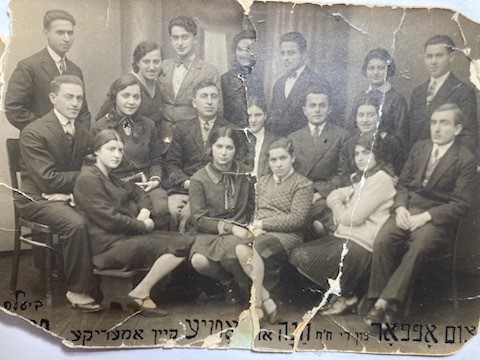
In the middle row,
seated, second from the left is Chana Kaplan,
fifth from the left
is Mordechai (aka Martin) Kaplan,
siblings of Charles
A. Kaplan.
As
I vaguely recollect, it was sometime later that Harry brought
the matter of selecting a suitable name for me to his business
partner, Bill Tracy, a tall, handsome, happy-go-lucky Irishman,
who being associated with Jewish people picked up a good bit of
Yiddish. I remember feeling very conspicuous and somewhat
embarrassed as they looked me over and Bill felt that “Charles”
would be an appropriate name for my Hebrew one which is
“Yehiel”. If the name Yehiel sounds odd to you, I would suggest
that you look in the book of Chronicles. There it is mentioned a
number of times, however, it is spelled with a “J”. I don’t
regret in the least being given the name Charles, I couldn’t
have picked a better one. Harry had cards printed with my full
name “Charles A. Kaplan”. Since Polish is read phonetically and
every syllable sounded “Charles” looked dubious to me, but I
very soon got well acquainted with my new surname.
_____
Updated
April
13, 2023
Copyright © 2023 Andrew Blumberg
JewishGen Home Page | KehilaLinks Directory
This
site is hosted at no cost by JewishGen, Inc., the Home
of Jewish Genealogy. If you have been aided in your
research by this site and wish to further our mission of
preserving our history for future generations, your JewishGen-erosity is
greatly appreciated.


